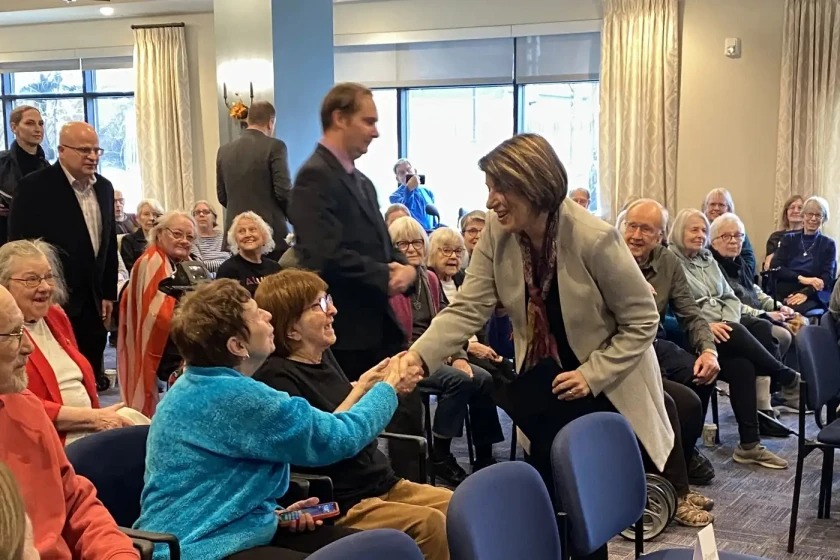
Dementia research and support to continue in Minnesota after Congress passes legislation
ST. PAUL — Legislation that was passed last week will provide research, education and support for those facing Alzheimer’s disease and dementia and their caregivers.
The bipartisan BOLD Infrastructure for Alzheimer’s Reauthorization Act will provide funding to state and local health departments to use for dementia risk reduction, early detection and diagnosis and evidence-based support of unpaid caregivers.
“With Thanksgiving this week and the holidays just around the corner, I know many of us are looking forward to spending time with our families, but anyone who has a loved one with dementia or Alzheimer’s knows that this can be challenging,” U.S. Sen. Amy Klobuchar said Wednesday. “It can be challenging for the person with dementia or Alzheimer’s, and it’s challenging for their family.”
Klobuchar spoke at Pillars of Prospect Park, a senior living facility in Minneapolis. She said the legislation is personal for her. Her dad, Jim Klobuchar, was diagnosed with late-onset Alzheimer’s and died in 2021.
“It is hard to realize someone doesn’t recognize who you are, or they are not the same. And there have been some really difficult times for people in the holidays, and we know that it gets us even more focused on our mission to get a cure for this disease, to do the scientific research we need,” she said.
One caregiver in attendance with her mom was Michelle Amen, who shared her appreciation for the legislation and the hope that it continues.
“As we transition to a new administration, I would hope that support would continue with more funding, as well as just educating the general public on what’s needed, and early detection,” Amen said.
The Minnesota Department of Health’s Healthy Brain Initiative and the BOLD Public Health Center of Excellence on Dementia Caregiving housed at the University of Minnesota have received funding from BOLD under this law.
The U’s center specifically researches with the intention of sharing evidence-based support for caregivers. It’s one of three similar centers across the nation. One of the other centers focuses on risk reduction, and the other focuses on early detection.
“The work that family caregivers do, how heroic it is, but can we continue to rely on that as a long-term care system? The answer, quite frankly, is probably not,” said Joseph Gaugler, director of the U’s center. “This is why federal investment, local investment in dementia as a public health issue is so critical.”
According to Klobuchar, nearly 7 million Americans are currently living with Alzheimer’s, including 100,000 Minnesotans.
Based on totals she shared, in the United States alone, over 11 million caregivers provided over 18 billion hours of care in 2020.
Klobuchar co-sponsored the reauthorization legislation, as did U.S. Sen. Tina Smith and Minnesota Reps. Angie Craig, Betty McCollum and Dean Phillips.
The BOLD Act was first passed in 2018. Robert Freeman, the Minnesota and North Dakota Alzheimer’s Association vice president of public policy, said it “established a public health framework to combat” Alzheimer’s. Congress passed the reauthorization last week, which will allow that work to continue.
Freeman also shared tips for those caring for loved ones with Alzheimer’s. He suggests being realistic, setting expectations with your family, and asking for help if needed. He also said to focus on what makes you happy.
He suggests involving your loved ones living with dementia in simple holiday preparations such as decorating, baking or singing. Also, to have quiet distractions like a photo album or a quiet place to sit if they get agitated.
And for those living with sundowning, a symptom where people with dementia become confused in the evening, Freeman said consider celebrating earlier on in the day.
Related Articles
Research finds widely used insecticide is common in shallow ground water across Minnesota
SunFed cucumbers and Costco eggs recalled due to potential salmonella contamination
A ‘yoga pill’ to end anxiety? Neuroscientists discover a brain circuit that instantly deflates stress
Working Well: The simple act of taking deep breaths can reduce stress and anxiety
Make America Healthy Again: An unconventional movement that may have found its moment

